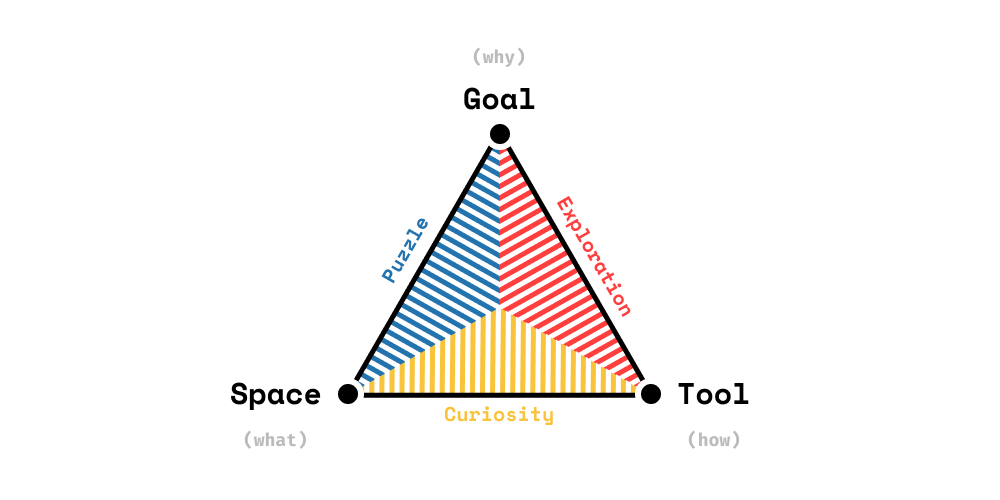Three engagement factors
Most mediums we interact with are passive: books, movies, social media. However Games are inherently engaging mediums because they combine three important factors for engagement: goals, spaces, and tools.

Alternative terms?- Goal — Space — Tool
- Why — What — How
- Dream — Knowledge — Skill
- Objective — Environment — Mechanic
- ??? — Conceptual Knowledge — Procedural Knowledge
At least two engagement factors must be present simultaneously to create an engaging experience. Each pair combines to form what I call the Three approaches to engagement: puzzle, exploration, and curiosity.
Static media often provide only one engagement factor at a time. If you read a book that gives writing advice (tools), but you do not have a goal in mind to write something you may not internalise the advice well, or only later engage with it. However if you have a project that you're working on (a goal) then a book related to this project will give you either the space or the tools to reach towards your goals (Personal projects structure learning and engagement).
Questions
- How do games switch between different engagement approaches? what is the "engagement graph"?
- Can the engagement be engaging? Nested engagement (e.g. exploration for the purpose of future curiosity)
- What about the difference between focused mind and unfocused mind in engagement? Does your mind have to be focused?
- If I say that I was really engaged with something immersive, where do I draw the line? Engaging mediums encourage thought, but sometimes immersive mediums can also create thought...
- Immersive mediums can be engaging over larger time scales, engaging mediums are engaging in the moment. Immersive mediums might make you think of them at a later point, engaging mediums are a conversation in the now.
- I wonder, what if you provide goal+tool, then use the same tool to provide goal+space, and then use the same space to provide space+goal, what would be the effects of alternating different engagement approaches in this style?
Notes
- Space and goal have parallels to declarative and procedural knowledge in educational psychology
- I cannot help but feel that my approach to thinking about these three engagement factors is overly simplistic. Only one word each does not really signify the depth and importance to this idea. I feel that it can be important in a wide range of disciplines but just looking at these diagrams gives no sense of what it really means...
- Why -- what -- how, is definitely an improvement in my own understanding—also the framing of thinking as conceptual and procedural knowledge
